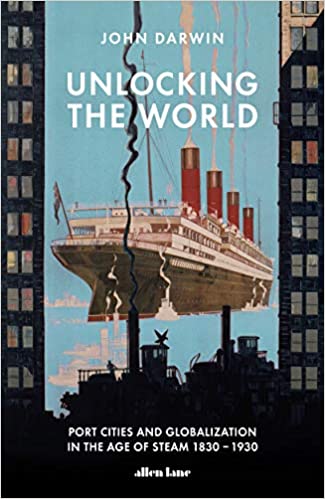I have to admit, reading and, now, reviewing John Darwin’s Unlocking the World has been a surreal experience for me. It was reading Darwin’s Unfinished Empire during senior year of undergrad that confirmed my decision to study the British Empire in grad school. I then had the distinct pleasure of studying under John in his program at Oxford (though not, as originally planned, with him as my direct supervisor). I’ve read professors’ books before, of course, particularly the works of Concerning History‘s shared mentor and friend, Ian Isherwood (one of which, Remembering the Great War, was the subject of our first Concerning History book club). This, however, was on another level from the start. Not only was it dedicated to the late Jan-Georg Deutsch, another one of my program supervisors (and the inspiration for another set of posts here), but I intimately recognized our seminar conversations on almost every page. Unlocking the World, in short, is a book written by one of my great historical influences and role models, which covers precisely the subject matter that I studied with him. It should come as no surprise, then, that I reveled in every second reading it.
Unlocking the World is a history of commerce and connection. The nineteenth century was one of increasing European empire and global domination, and that domination was increasingly focused on and through particular port cities that served as loci for trade and internal continental penetration. Darwin takes these cities as his subject, demonstrating how they all interacted with their hinterlands, their mother empires (if applicable), and the age of steam in general. In so doing, Darwin shows how steam made or broke many locales, and how the specific circumstances and politics of cities could lead to boom or bust. For all his academic rigor (he once had my colleagues and I recite the British Viceroys of India in order), Darwin is also one of the most approachable academic writers I know. Rather than a series of intellectual case studies, Unlocking the World begins with a discussion of the many tropes and characterizations that make a port city before then moving into a brief history of trade and international contact from ancient history to the nineteenth century. As I remarked to Francis as I was reading, Darwin is an historian, and the best historians know context is everything.
For those who have not read any of Darwin’s works before, however, Unlocking the World may come off as a bit odd. It is a serious, though accessible, work of history by a distinguished academic…without a noticeable thesis. For those who know how to look, however, Darwin’s arguments reveal themselves as a series of premises, even paradigms, through which he proposes to view the history which he is relating and, consequently, revise our interpretation of it. Here, Darwin deals with a duet of paradigms: first, that globalization should be seen as a process, not a definable world state, and that it provides a fruitful way of describing the 19th century; second, that this kind of commercial history cannot be written in a vacuum, and that prosperity or ruin for these cities, and steam globalization as a whole, depended on geopolitical processes just as much as on technology or commodities. Darwin so successfully integrates these paradigms, themes almost, that it is hard to imagine relating the history of steam globalization without them.
One of the biggest drawbacks of Unlocking the World is, unfortunately, inherent in the writing of global history: not everything deserving of coverage can be discussed in a single volume or a single lifetime’s work. Darwin uses approximately a dozen major port cities as his case studies, clustered into four main regions: North America, India, the South China Sea, and Europe. No South American, African, or Oceanic cities make the list, nor do any on North America’s West Coast. Yet it is hard to criticize too much when Darwin himself recognizes these limitations, and that the addition of each new city would likely have added years of additional work to the project.
As alluded to above, I cannot recommend Unlocking the World (or any of Darwin’s other works) highly enough to those interested in global history, 19th century empires, or honestly any of my own previous blog posts. His mastery and plain, compelling relation of the connections and frameworks of global and imperial history is one that I have taken to heart, and one that more could afford to embrace as they approach their own niches of the past.
